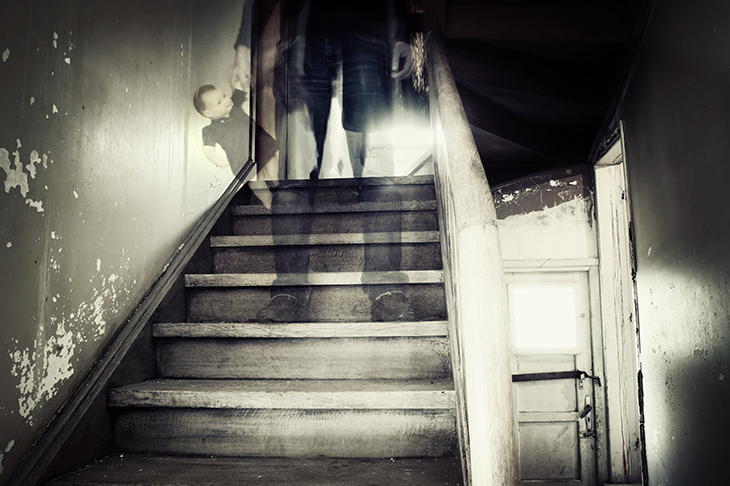To begin with it was mice. The house was overrun with them. She saw them out of the corner of her eye shooting across the room. Then they became bolder. Instead of running away they ran towards her, menacing her. So she set traps and laid poison. I’d come home and open a linen drawer and find a trap set in it or blue granules in a plastic tray. Then a mouse ran up her leg.
Her brother, a farmer turned smallholder, has been waging war on rats and mice all his life. He keeps abreast of the literature and advances in rat-extermination technology. He advised deafening them with plug-in sonic devices. She bought three, whose continual blue flashing aids navigation around the house after dark, saving on light bulbs. That put them off, except for this one enormous rat, who would slip in under her duvet at night and fiddle about at her feet.
Then it was strange people in the house at night, sometimes a crowd of them, who would assemble in her bedroom talking animatedly among themselves yet ignoring her as if she wasn’t there. What were they, we wondered? Some sort of club or association perhaps? She had no idea. But they seemed well acquainted with one another, she said. So what did they look like? That she couldn’t say, because while she strongly felt their presence she couldn’t actually see them.
After their meeting they would all go except one man, who would get into bed with her and go to sleep. Perhaps it was someone who had come a long way. His presence in bed beside her was a nuisance because she was too polite to wake him and had to lie still in the same position all night.
During the day these uninvited visitors were absent. Then three turned up unexpectedly one afternoon. Once a week a church group meets for prayer and Bible study in the warm room where she sits during the day. Adjoining this room is a dining room, visible through double glass doors. Glancing through these glass-paned doors during the Bible study, she noticed three strangers sitting at the dining table. They were two men and a woman and they were sitting silent and still as though waiting for somebody or something. They stayed about an hour and this trio she could actually see. The clothes were quaintly old-fashioned and she liked their personalities.
Until now my mother has been equivocal as to whether all these people are real or imagined. But now she has three regular night visitors whom she can not only see distinctly but whom she loves. On the low chair close to the bed sits a man. He is leaning forward deep in thought. Sitting on the further chair is a woman cradling her baby against her shoulder so lovingly that my mother is moved by it. They are a young family, she thinks, quietly and profoundly and lovingly united. Again the clothes are old-fashioned. They never look at her and are always silent. But this is because they are polite. Their motive is concern for her and companionship.
An additional, final duty this week has been that I kneel before her in her bedroom as she sits on the low chair that will later be occupied by the meditative young man. From this humble position I unlace her shoes and remove her feet from them. I then remove her socks and replace them with her gay bed socks. It’s a cold room and it is usually from this kneeling position that I try to argue her out of her old-fashioned frugality and implore her to permit me to switch on the cereal packet-sized fan heater that stands on her dressing table. But my mother is more frightened by a number, especially a number printed on an electricity bill, than she is discomposed by exposure to the cold.
On this occasion she changed the subject adroitly to the young family who keep their unflagging, unobtrusive vigil over her during the night. Lowering her already quiet voice to express an entirely new, considered and controversial conviction, she said: ‘I think they are real. They must be.’ As I unsheathed a bare foot from a sock, the shock of recognition of revealing a part of her body with which I used to be intensely familiar but have seen only very rarely in the past 50 years unsettled me. ‘Real people wearing fancy dress break in every night, sit with you till morning, then leave? Or do you mean they are real apparitions?’
So I reminded her again that hallucinations are a common side effect of the otherwise miraculous drug Madopar, which has kept her Parkinson’s disease at bay for coming up to five years. The time, however, she wasn’t entirely convinced. ‘But the baby is such a dear, dear little thing,’ she said.
Got something to add? Join the discussion and comment below.
Get 10 issues for just $10
Subscribe to The Spectator Australia today for the next 10 magazine issues, plus full online access, for just $10.
You might disagree with half of it, but you’ll enjoy reading all of it. Try your first month for free, then just $2 a week for the remainder of your first year.















Comments
Don't miss out
Join the conversation with other Spectator Australia readers. Subscribe to leave a comment.
SUBSCRIBEAlready a subscriber? Log in